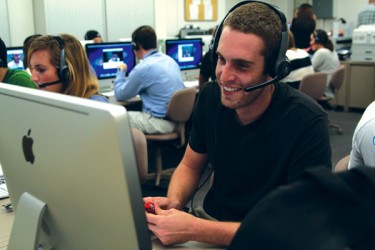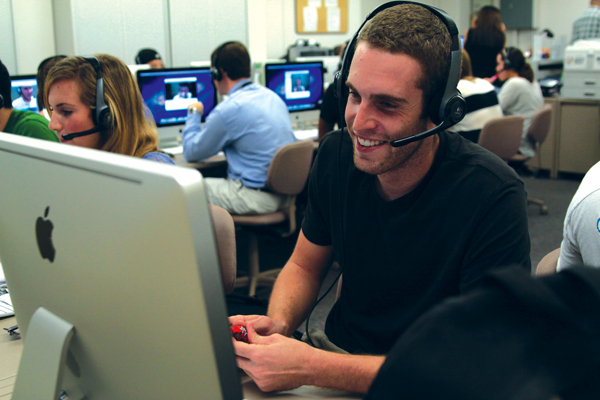
This Halloween, students in several Spanish classes exchanged candy for caramelos.
A partnership with a university in Colombia paired UM students up to practice their language skills during Skype conversations.
This interactive class was divided into 20 minutes of English and 20 minutes of Spanish.
“The experience allows the students to improve their listening skills and use the language in a real-time setting,” said Rachida Primov, the director of the Eleonore Graves Tripp Foreign Languages Laboratory.
The program is mainly designed for beginner students that do not come from Spanish-speaking backgrounds.
“They make connections to the textbook material,” said Irene Beibe, a Spanish lecturer in the Department of Modern Language and Literature. “In addition to the grammar and structure, students learn about the frustrating moments of communicating in a new language.”
The virtual immersion program is in its fifth semester.
Primov contacted and worked with universities abroad to see whether they had the capabilities to fulfill such a task. To attain successful contact, she looked for schools that can support good Internet connection and are familiar with programs like Skype.
The list of contacts includes Chile, Brazil, Mexico, Spain and Colombia. Next semester, UM students in French classes will chat with students from Algeria and a university in Paris. While this is still a pilot program, Primov hopes to expand it.
“Right now, we do not have the facilities to implement a widespread program,” Primov said. “However, I do hope that one day students will work on projects with students abroad instead of just communicating on certain days.”
The language labs currently have enough stations for 20 students to communicate with an equal number of students abroad. The preparation for the conference also takes a considerable amount of time with a process called a beta trial. Before each class, lab coordinator Matt Lubeck works with student techs and tests every computer to verify features such as Internet connection and bandwidth.
Beibe enjoys seeing her students interact with their Skype partners.
“Sometimes students forget about the language division and want to continue to speak in Spanish for the full time,” she said. “They love it.”
In the spirit of Halloween, she had her students sing the “Trick or Treat” chant to their friends abroad. The students were also able to mail each other bags of candy before the session.
Oscar Mora, a Colombian professor who teaches English, said the entire experience was a “win-win,” or “todos ganan.”
“For the program to work, there has to be collaboration among professors and students,” said Mora in Spanish. “Student reciprocity also plays a role.”
Students were equally excited about the virtual exchange.
“It’s a great opportunity to practice with fluent speakers and make good connections,” senior Jarrett Lane said.
Senior Jamie Swartz used the chat to learn more about her immersion partner.
“While we dance to house music, they dance to salsa and merengue,” she said.
But senior Elizabeth Brasch’s experience stands out from the others. Brasch, who is majoring in art, plans to send a painting to her Skype friend while he sends her a handmade rosary.
“[Virtual immersion] is fun,” she said. “What you’re learning has value. I now have a neat story to talk about someone I know from abroad.”






